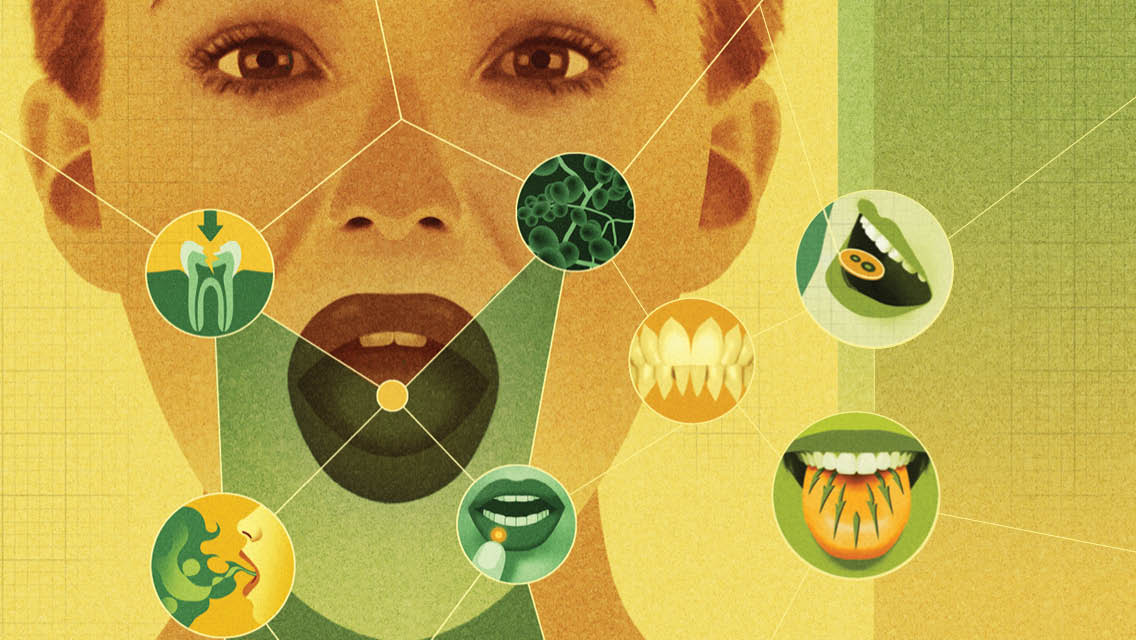Let’s face it. Most of us take our teeth for granted. Sure, we brush and floss (well, some of the time). And we know, of course, that teeth are essential for chewing our food and for maintaining a beautiful smile. But when we get a cavity – or even when we get diagnosed with gum disease that might culminate in root canals or tooth loss – we seldom think of these problems as posing permanent risks to our health and vitality.
We simply don’t place the same importance on our dental health as we do on, say, the health of our vital organs. After all, the mouth is the domain of the dentist; the body, the domain of the doctor.
But that perspective is changing. Recent research provides convincing evidence that oral health and overall health are inextricably linked – that what’s good for our mouth is also good for the rest of the body we work so hard to keep fit and healthy. Dentists increasingly screen for systemic diseases, which involve many organs or the whole body, through tongue assessments, saliva tests, blood pressure checks, and simple observation of the teeth and gums. As well they should: More than 90 percent of systemic diseases have oral symptoms such as lesions, according to the Academy of General Dentistry. Dentists are also checking for signs of inflammation that could affect heart health as we age. When they see trouble, they make referrals to physicians.
To emphasize the connection between oral health and overall health, Vincent J. Iacono, DMD and former president of the American Academy of Periodontology, offers the not-so-appealing metaphor of the mouth as a garbage dump on the edge of a river: “You wouldn’t be surprised if the lake downstream ended up polluted with the garbage from the dump. A patient’s bloodstream acts very much like the river in this analogy, in that it carries the bacteria from the periodontal plaques, possibly ‘polluting’ the arteries of the heart with periodontal bacteria, causing inflammation of the arteries, which may lead to a heart attack. This potential effect of periodontal bacteria further supports the need for periodic deep cleanings to enhance overall health and well-being.”
This same effect has also convinced the American Heart Association (AHA) that dentists are very much on the front lines of healthcare. In addition to helping us keep our teeth firmly planted in our mouths as we age, oral-health experts are also destined to play a more important role in helping us maintain our vitality and overall quality of life.
A New Approach to Dental Health
This link between oral and overall health, now becoming common in conventional dentistry, has for years been a key tenet of what’s known as holistic dentistry, which takes an integrated approach to dental care. Holistic dentists advocate for optimal nutrition. They take a minimally invasive approach to resolving dental problems. Some even evaluate a patient’s skeletal structure and, of greatest controversy, often shun the use of fillings that contain mercury and call for replacing those amalgams.
Holistic dentists consider conventional dentists too quick to remove troublesome teeth, perform root canals, and insert “unnatural” substances and appliances into the mouth, arguing that these toxic substances create unhealthy imbalances in the mouth’s natural ecosystem. But there are signs that the members of the Holistic Dental Association and the American Dental Association (ADA) may be inching closer together, at least philosophically.
Conventional dentists like P. Piero, DDS, of Holland, Mich., an ADA member in good standing, have some doubts about many of holistic dentistry’s claims and methods. But Piero is pushing his colleagues further in the direction of what many in the profession are calling a “whole-person” approach to dentistry. Piero, who has spent two decades developing his own oral-care system (www.dentalairforce.com), represents a new breed of dental practitioner. He considers himself a teacher and passes along what he learns about oral health and hygiene to his patients. He isn’t shy about discussing the difference between good and bad bacteria, their role in building plaque, and what happens when the bad guys get loose in the bloodstream. A visit to Piero may include a conversation about changes in diet and lifestyle – changes, he emphasizes, that could prevent not only tooth decay but also tooth loss. He knows that the longer his patients keep their teeth, the longer they’re likely to live.
Healthy Mouth, Healthy Body
Good oral health calls for more than just brushing and flossing. It requires eating nutritious foods, exercising, avoiding cigarettes and alcohol, and controlling blood pressure. It may also mean looking to your dentist as a resource for more than cleanings and fillings. After all, troubles in the mouth not only predict disease, they can also exacerbate and even cause it.
John Laughlin III, DDS, of River Falls, Wis., has been practicing holistic dentistry for years. Many patients come to him when nothing else has eased their chronic pain or fatigue. Laughlin recalls one woman who came to him because she developed such severe flulike symptoms following a root canal that she “thought she was dying.” She’d consulted several doctors who could find no cause for her symptoms.
Laughlin, suspecting an infection below the crown capping the root canal, referred her to an oral surgeon to have the tooth removed. The oral surgeon refused because, as Laughlin puts it, “he could see nothing wrong with the tooth.” Six weeks and three doctors later, the woman finally signed papers absolving her surgeon of any responsibility for the outcome. He then removed the tooth – and found that the dead nerve remnant beneath it was not only infected but that the infection had spread to the bone, which was badly eroded.
More surgery was required to fill the large hole with bone taken from her inner cheek. The woman’s symptoms immediately disappeared. She credits Laughlin with saving her life.
An equally convincing and more far-reaching example of the mouth-body health connection is evidenced by the well-established link between periodontal disease (infected gum tissue that can lead to tooth loss) and cardiovascular illness. Such disease is now considered as reliable a predictor of cardiovascular disease as smoking, diabetes, hypertension, high cholesterol and elevated serum triglycerides. A 2004 AHA study found that pericoronitis (infected wisdom teeth) heads the list of dental risk factors for heart disease. Others, in order of importance, are gingivitis, root remnants, cavities and missing teeth.
Periodontal disease has also long been associated with diabetes; now it’s being linked to other chronic illnesses involving not just the heart but also the lungs and the brain, and to low-birth-weight babies and preeclampsia (a condition characterized by high blood pressure and the presence of protein in the urine). It is also known to be more prevalent in postmenopausal women, probably because of lower estrogen levels, which also cause bone loss and, not incidentally, heart disease.
How all these problems intersect remains somewhat mysterious. Consider tooth loss: Like other oral health problems, it involves a vicious cycle. An older person who has lost teeth and can’t chew properly doesn’t get all the nutrition available in food, which exacerbates the underlying problem that caused his or her teeth to have a precarious grip in the first place. In other words, the gum disease itself may have a nutritional basis (too many doughnuts and soft drinks, perhaps), which in turn caused systemic problems such as poor bone health or a chronic disease. Healthcare providers do know that tooth loss is a predictor of longevity (the longer we keep our teeth, the longer we live) and that losing teeth nearly doubles a person’s heart-attack risk.
Inflammation and Cardiac Illness
Need more convincing about the mouth-body connection? Consider the death of a middle-aged man who’d had a defective heart valve replaced and seemed to be recovering well: He was told to take antibiotics before dental visits to prevent infection from bacteria that can escape from the mouth into the bloodstream during cleaning. Apparently the antibiotics weren’t enough to prevent a massive infection, which led to a fatal heart attack.
The fact that inflammation – often a result of infection – causes strokes and heart attacks has been widely accepted and is now being studied in depth by the AHA. Nowadays, it’s not unusual during a routine physical to be given a test for C-reactive protein, a marker for systemic inflammation, especially if you have other risk factors for heart disease. Bad teeth, poor oral hygiene and diet are usually implicated when inflammation is detected.
Saliva is our first line of defense against the “bad” bacteria that cause plaque to form on our teeth. Plaque buildup may cause gingivitis, which can lead to periodontitis and, if left unchecked, to something called acute necrotizing ulcerative gingivitis, or trench mouth. Bacteria from those conditions can enter the bloodstream after routine dental cleanings, or even after flossing and brushing at home. Bad bacteria can also make its way into the bloodstream when saliva flow is reduced because of antibiotics or medications, such as antidepressants, disrupting the normal bacterial balance of the mouth.
Bacteria that manage to slip into the bloodstream (called bacteremia) could cause an infection elsewhere, especially if a body’s immune system has been weakened by a disease like AIDS or by cancer treatments. And if those bad bacteria find their way to the lining of diseased heart valves, the result can be infective endocarditis. That’s the condition that took the life of that middle-aged man who thought he was on the road to cardiac health, but died after a routine dental cleaning.
The Case for Good Hygiene
In his practice, Piero addresses systemic problems with patients even as he is filling their cavities or helping them decide whether to straighten their crooked teeth. He considers anything unnatural in the mouth dangerous (whether a crown, an implant or a cosmetic veneer), but not because of the fear of mercury toxicity often cited by holistic dentists. Rather, he says, such things interfere with what he thinks is the most important issue in dentistry: the battle against bad bacteria.
“The mouth is a war zone,” Piero says, referencing the more than 500 species of bacteria that inhabit it. “Bad bacteria are usually anaerobic – they live in the absence of air.” Their excrement turns into plaque, which is actually a multilayered biofilm and very difficult to remove once it’s got a foothold, and especially dangerous if its presence has created periodontal inflammations known as pockets. This process causes illness in other parts of the body not just by allowing bad bacteria into the bloodstream but also by causing the body to fight back with enzymes called cytokines that trigger a systemic inflammatory response. He believes this cycle is the primary link between oral and whole-body health.
“Hygiene is everything,” says Piero, who recommends patients visit him four times a year for intensive cleanings, rather than the standard twice-yearly visits. “A 16-year-old kid can have perfect teeth, but his beautiful smile won’t last long without good dental habits. It’s like letting your new Ferrari sit out in the rain. I’m looking at the long term. Our kids are going to live to be 100. Their teeth have to last that long, too.”
Piero points out that bacteria can be spread through any sort of contact. “Yes, periodontal disease is hereditary, but it is also an infectious disease. Kissing, eating – many activities bring new kinds of super-smart bacteria into the mouth. They are highly adaptive: They can change quickly to new conditions in order to survive.”
Given the potential impact oral conditions can have on our total health, says Piero, it would be wise for us to show the same respect for our teeth that we would to other parts of the body. “The area of our exposed gum tissue equals that of our forearm, about 9 square inches,” he points out. “What would we do if suddenly our forearm was inflamed? We’d run to the doctor. But periodontal disease is painless. Hidden.” And so we ignore it.
Dentistry for Life
Jessica Saepoff, DDS, belongs to the ADA and five other major dental organizations. Like Piero, she has developed her own interpretation of holistic dentistry. Her practice, Natural Dental Health Associates, in Issaquah, Wash., specializes in alternative methods, which she considers not so much alternative as simply the most advanced. She routinely communicates with her patients’ other holistic health practitioners so they can work together toward comprehensive health goals.
For Saepoff, dental care always comes down to personal choice. “I tend to attract patients who are opposed to taking even small theoretical risks, whether it’s eating pesticides in their food or having mercury in their mouths,” she says. “I understand that drilling is sometimes necessary, but the goal of my practice is to preserve natural tooth structure.”
Whether you take the holistic path to oral health or the conventional approach, one thing is certain: The way you think about your teeth may change dramatically in coming years, as new studies shed more light on the myriad ways in which a healthy mouth is essential to overall health and vitality, and a key factor in longevity. With your doctor and your dentist by your side, you’ll be able to keep your smile beautiful, and to keep flashing that great grin for years to come.
Beyond Brushing
Mounting evidence suggests that good dental habits not only help prevent cavities and give you a gleaming smile, they also help you live a longer, healthier life. Here’s how you can make sure you’re doing right by your teeth:
- Brush after meals and floss at least once a day. After brushing, rinse your gums with an alcohol-free mouthwash (to avoid the drying effect caused by alcohol, and to avoid killing off the good bacteria that helps keep the bad bacteria at bay). Eco-Dent and Tom’s of Maine are natural options, or if you have sensitive gums, try a soothing rinse like Biotene. Consider an electric tooth cleaner if your dentist tells you brushing and flossing aren’t controlling your plaque buildup.
- Watch what you eat. Limit your intake of refined sugar, sweetened soft drinks and processed foods; in their place, add more fruits and vegetables (preferably raw), whole grains, calcium, and vitamin C; eat foods that strengthen your jaw and promote circulation during chewing. Poor nutrition can make your mouth more susceptible to infections and make it tougher to fight them off.
- Visit the dentist at least once a year (more frequently as you get older). Regular cleanings reduce the buildup of plaque, which causes periodontal disease.
- Get regular exercise to improve digestion and blood flow to the gums.
- Don’t smoke. Tobacco is a leading cause of dental infections, contributing to more than 50 percent of the cases of periodontal disease in U.S. adults.
- If you’re pregnant or entering menopause, be aware that hormone changes can cause the gums to become red and tender and to bleed easily.
- Reduce stress. Excessive stress can make it more difficult for the body to fight off infections, including those that can lead to periodontal diseases.
- Make sure your dentist knows what drugs you’re taking. Medications such as oral contraceptives, antidepressants and certain heart medications can affect oral health.
- Be aware that oral piercing (which can also cause tooth damage), as well as drug and alcohol abuse, may disrupt the balance of good and bad bacteria in your mouth.
- Know your genetic makeup. A family history of periodontal disease puts you at greater risk. Also, tell your dentist if you have a systemic disease that might interfere with your immune system or worsen the condition of the gums and supporting bone.
- Talk to your doctor about taking antibiotics before dental visits if you have a heart condition that might make you more susceptible to infection.
What is Holistic Dentistry?
They promote a cross-disciplinary approach to patient care on the belief that conventional dentistry focuses too narrowly on discrete specialties that may distort a patient’s overall picture of health.
Holistic dentists range widely in how they put their philosophy into practice. For instance, John Laughlin III, DDS, of River Falls, Wis., focuses on skeletal issues, such as chronic pain caused by poor jaw alignment, which may be related to difficult birth procedures, a genetic abnormality, or drifting of the teeth and jaw due to tooth extraction. It may also be associated with pharyngeal (throat) airway dysfunction and tongue posture, which can affect your quality of sleep, your breathing and your stress levels. Victor Zeines, DDS, of New York City and Woodstock, N.Y., emphasizes nutrition and promotes natural dental products. Gerald H. Smith, DDS, president of the Holistic Dental Association, is concerned about the potential toxicity of fluoride in drinking water (put there to strengthen teeth against tooth decay) and mercury in metal fillings. He is convinced that metal in the mouth can work like a battery, sending electrical currents into the brain that can have deleterious neurological effects, though he can’t point to a study that proves his theory.
While holistic dentists generally agree that any “unnatural” additive is guilty until proven innocent, conventional medicine acts on the premise that a thing scientifically proven effective in treating illness is innocent as long as it can’t be tied definitively, through systematic study, to a negative outcome. Thus, the American Dental Association (ADA) has conducted a series of ongoing mercury studies. They have yet to show mercury in dental amalgams to be a health risk. However, the ADA announced a new trial in January.




This Post Has 0 Comments